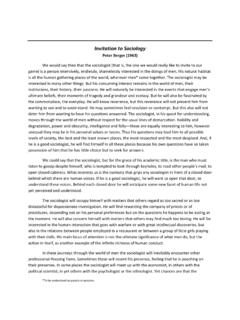Transcription of Peter L. Berger (1) INVITATION TO SOCIOLOGY A Humanistic ...
1 Peter L. Berger (1) INVITATION TO SOCIOLOGYA Humanistic AS AN INDIVIDUAL PASTIMET here are very few jokes about sociologists. This is frustrating for the sociologists, especially ifthey compare themselves with their more favored second cousins, the psychologists, who havepretty much taken over that sector of American humor that used to be occupied by clergymen. Apsychologist, introduced as such at a party, at once finds himself the object of considerableattention and uncomfortable mirth. A sociologist in the same circumtance is likely to meet with nomore of a reaction than if he had been announced as an insurance salesman.
2 He will have to win hisattention the hard way, just like everyone else. This is annoying and unfair, but it may also beinstructive. The dearth of jokes about sociologists indicates, of course, that they are not as muchpart of the popuIar imagination as psychologists have become. But it probably also indicates thatthere is a certain ambiguity in the images that people do have of them. It may thus be a goodstarting point for our considerations to take a closer look at some of these one asks undergraduate students why they are taking SOCIOLOGY as a major, one often gets thereply, "because I like to work with people.
3 " If one then goes on to ask such students about theiroccupational future, as they envisage it, one often hears that they intend to go into social work. Ofthis more in a moment. Other answers are more vague and general, but all indicate that the studentin question would rather deal with peopIe than with things. Occupations mentioned in thisconnection include personnel work, human relations in industry, public relations, advertising,community planning or religious work of the unordained variety. The common assumption is thatin all these lines of endeavor2one might do something for people," "help people," "do work that is useful for the community.
4 "The image of the sociologist involved here could he described as a secularized version of the liberalProtestant ministry, with the YMCA secretary perhaps furnishing the connecting link betweensacred and profane benevolence. SOCIOLOGY is seen as an up-to-date variation on the classicAmerican theme of "uplift." The sociologist is understood as one professionally concerned withedifying activities on behalf of individuals and of the community at of these days a great American novel will have to be written on the savage disappointmentthis sort of motivation is bound to suffer in most of the occupations just mentioned.
5 There ismoving pathos in the fate of these likers of people who go into personnel work and come up forthe first time against the human realities of a strike that they must fight on one side of the savagelydrawn bittle lines, or who go into public relations and discover just what it is that they are expectedto put over in what experts in the field have called "the engineering of consent," or who go intocommunity agencies to begin a brutal education in the politics of real estate speculation. But ourconcern here is not with the despoiling of innocence. It is rather with a particular image of thesociologist, an image that is inaccurate and is, of course, true that some Boy Scout types have become sociologists.
6 It is also true that abenevolent interest in people could be the biographical starting point for sociological studies. But itis important to point out that a malevolent and misanthropic outlook could serve just as insights are valuable to anyone concerned with action in society. But this action neednot be particulary humanitarian. Some American sociologists today are employed by govermentalagencies seeking to plan more livable communities for the nation. Other American sociologists areemployed by governmental agencies concerned with wiping communities of hostile nations off themap, if and when the necessity3should arise.
7 Whatever the moral implications of these respective activities may be, there is noreason why interesting sociological studies could not be carried on in both. Similarly, criminology,as a special field within SOCIOLOGY , has uncovered valuable information about processes of crime inmodern society. This information is equally valuable for those seeking to fight crime as it would befor those interested in promoting it. The fact that more criminologists have been employed by thepolice than by gangsters can be ascribed to the ethical bias of the criminologists themselves, thepublic relations of the police and perhaps the lack of scientific sophistication of the gangsters.
8 Ithas nothing to do with the character of the information itself. In sum, "working with people" canmean getting them out of slums or getting them into jail, selling them propaganda or robbing themof their money (be it legally or illegally), making them produce better automobiles or making thembetter bomber pilots. As an image of the sociologist, then, the phrase leaves something to bedesired, even though it may serve to describe at least the initial impulse as a result of which somepeople turn to the study of additional comments are called for in connection with a closely related image of thesociologist as a sort of theoretician for social This image is understandable in view of thedevelopment of SOCIOLOGY in America.
9 At least one of the roots of American SOCIOLOGY is to befound in the worries of social workers confronted with the massive problems following in thewake of the industrial revolution-the rapid growth of cities and of slums within them, massimmigration, mass movements of people, the disruption of traditional ways of life and the resultingdisorientation of individuals caught in these processes. Much sociological research has beenspurred by this sort of concern. And so it is still quite customary for undergraduate studentsplanning to go into social work to major in , American social work has been far more influenced by psychology than by sociologyin the devel-4opment of its "theory.
10 " Very probably this fact is not unrelated to what was previously said aboutthe relative status of SOCIOLOGY and psychology in the popular irnagination. Social workers havehad to fight an uphill battle for a long time to be recognized as "professionals," and to get theprestige, power and (not least) pay that such recognition entails. Looking around for a professional" model to emulate, they found that of the psychiatrist to be the most natural. And socontemporary social workers receive their "clients" in an office, conduct fifty-minute "clinicalinterviews" with them, record the interviews in quadruplicate and discuss them with a hierarchy of"supervisors.









